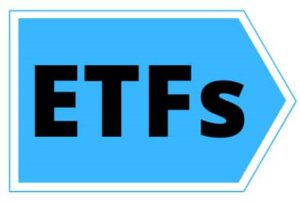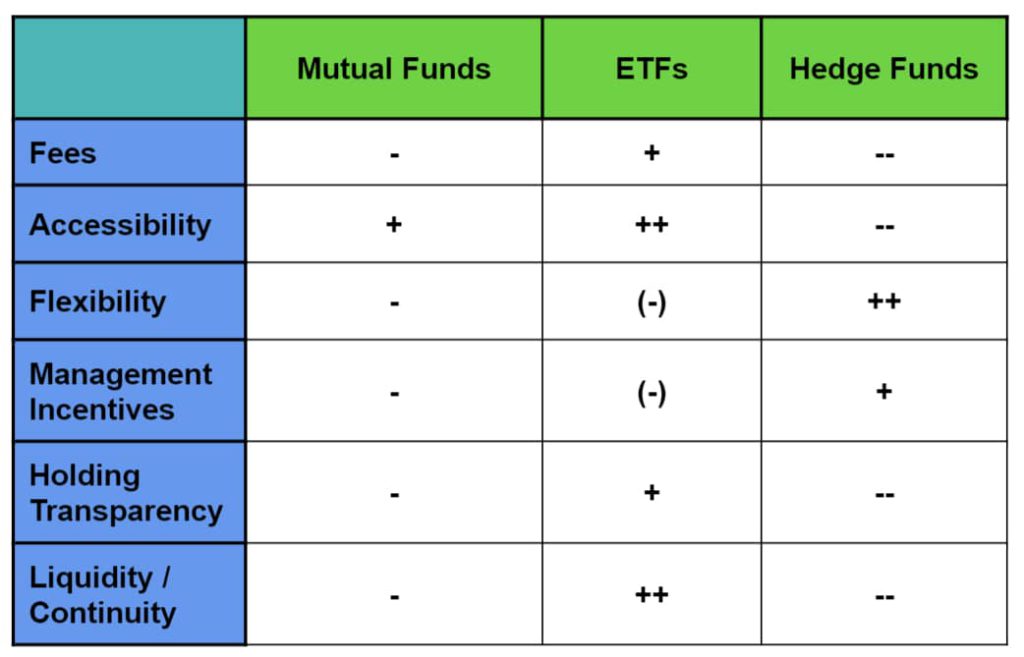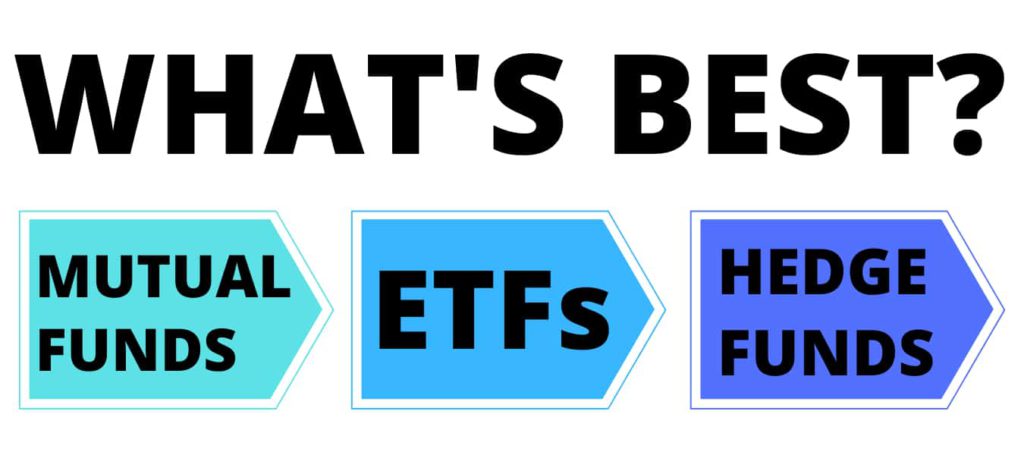Close to 50% of all US households own some kind of mutual fund shares. Nevertheless, a great deal of these people doesn’t actually understand how exactly their money is being allocated.
In this article, you will learn what exactly a mutual fund is and some similar alternatives such as exchange-traded funds and hedge funds. After finishing this article, you should have a much better understanding of what you should be putting your financial future into.
What are Funds?
First of all, let’s start with some common ground between mutual funds, exchange-traded funds, and hedge funds. In this section, I will be referring to these types of funds simply as funds.
Funds are a certain class of investment vehicles. The idea behind these funds is taking advantage of pooled investing. Pooled investing is when you collect a pool of money from a group of investors and use this money to invest in a variety of securities such as stocks, bonds, options, etc. Each investor will then receive a profit (or loss) of the entire portfolio in proportion to the money that he/she put up. Depending on the fund, it can be invested in a few dozen to multiple thousand securities at a time.
One of the main reasons why funds are so popular is that they provide the benefits of large amounts of capital to every investor even if the investor only can afford a small investment. Some of the benefits of investing with a lot of capital are diversification, high buying power, and low transaction costs per trade.
Another benefit of funds is that they have professional management teams and expert investment advisors/traders. The main difference between mutual funds, exchange-traded funds, and hedge funds are the investment style of this management, the regulations/rules, and accessibility.
What are Mutual Funds

If you have a 401 (k) retirement plan, chances are high that you own some kind of mutual fund shares.
Mutual fund shares can be thought of like shares of a stock with the main difference being that mutual funds are in the business of investing instead of the business of selling products or services. Furthermore, unlike stock shares, mutual fund shares do not grant the investor any voting rights.
Mutual funds are usually portfolios that are being actively managed by professional investment advisors and money managers. They can be divided into different types, depending on their area of investment and investment objective. A typical mutual fund is invested in, somewhere between, 100 and 3000 securities at a time.
For instance, an equity growth mutual fund would be a mutual fund that specializes in growth stocks. Besides equity funds, there also exist mutual funds specializing in fixed-income, emerging markets, indexes, and various other areas. Thus, some mutual funds have a more conservative and others a more aggressive and risky investment style.
Mutual fund share prices are typically quoted in their net asset value (NAV) per share (NAVPS). Like the name says, this is the value of all combined positions divided by the total number of outstanding shares. This price is recalculated and updated at the end of each trading session. This means mutual fund prices aren’t updated throughout the day like most other security prices are.
Depending on the current investments of a mutual fund, it can also pay out dividends (or other forms of capital distribution). For instance, if a mutual fund owns shares of a stock that just paid out dividends, it will normally forward these dividends to its investors.
There are two main categories of mutual funds:
- Open-end mutual funds: Open-end funds can always issue as many new shares as they want to. New investors typically buy their shares directly from the mutual fund instead of from existing investors. Open-end funds are more popular than close-end funds.
- Close-end mutual funds: Close-end funds only have a fixed number of shares that can be traded on the open market after the funds’ initial public offering (IPO). Close-end funds prices aren’t only determined by their NAV. They are affected by the supply and demand of their shares and are thus, updated on an intraday basis.
One key difference between most mutual funds and hedge funds is their inflexibility due to regulations. Apart from certain specialized long-short mutual funds, the vast majority of mutual funds can only buy securities. This means they can’t, for instance, short a stock. Thus, mutual funds flexibility is restricted to their position sizing. Therefore, many mutual funds have severe problems in bear markets.
Another noteworthy aspect of mutual fund regulations is their lack of transparency. Mutual funds are only required to disclose their holdings on a quarterly basis. Therefore, it is often unclear for investors to know what exactly their money is invested in.
Next up, let’s discuss fees and commissions of mutual fund investing. Mutual funds divide their fees into two categories:
- Annual operating fees (expense ratio): These fees go to holding the mutual fund intact. Expenses such as management, legal, marketing, and other costs are paid through these fees. Annual operating fees are expressed in an annual percentage of your investment. This figure is typically between 0.2% and 1.5%. Usually, the more active a fund’s investment style, the higher these fees are. Note that annual operating fees are independent of a mutual fund’s investment performance.
- Shareholder fees: These fees include all the commissions related to buying, selling, redeeming and maintaining your position in a mutual fund. Besides, having to pay broker commissions when buying or selling mutual fund shares, most mutual funds also charge commissions for buying/selling their shares. Furthermore, many mutual funds have so-called redemption fees that you have to pay if you close your position within a short time of opening it.
Note that the details of the fee structure can vary from fund to fund. Therefore, it is crucial to check the specific fees that will apply before investing in any mutual fund!
Looking at the fee structure is just as important as looking at a mutual fund’s performance because high costs will lead to worse actual returns for you as an investor.
Most Americans own mutual fund shares through their 401 (k) retirement plan. Generally, most retirement-related money management is heavily invested in the mutual fund industry. Typical retirement plans invest in more active and ‘aggressive’ mutual funds in the early stages of someone’s career and settle for more conservative funds such as fixed-income later down the road when people can’t afford the risk anymore.
What are ETFs

Next up, let’s go over exchange-traded funds (ETFs). Exchange-traded funds are very similar to mutual funds with the main difference being that they are directly traded on an exchange (hence the name). Additionally, ETFs tend to be more passively managed than mutual funds. Thus, ETFs usually have much lower fees.
Similar to mutual funds, there also are different types of ETFs for every market sector. For instance, there are ETFs tracking different equities, others tracking commodities, fixed-income or a different sector. The most common and popular ETFs track major market indices such as the S&P500.
Now let’s take a closer look at the pricing of exchange-traded funds.
Just like mutual funds, ETFs also have a net asset value (NAV). This, however, is not directly used to determine the market price of ETF shares. Instead, the price of an ETF is determined by the supply and demand of its shares. Usually, the market price of an ETF is very close or even the same as its NAV per share.
ETF prices are updated on an intraday basis, just like stock prices are. In general, ETFs function and trade quite similar to stocks.
Generally speaking, fees and commissions for ETFs are much lower than those of mutual funds. ETFs also have expense ratios like mutual funds, but these tend to be much lower. Furthermore, when it comes to ‘shareholder fees’, ETFs only have the commissions you pay your broker when opening or closing your position (just like with stock trades). Depending on the broker, this can be as low as a few dollars.
Especially in recent years, ETFs have gained in popularity. Just to give you an example of how popular some ETFs have become, let’s look at SPY:
SPY is an ETF tracking the S&P500 index. SPY is currently the most actively traded security worldwide with an average daily volume of about 70 million shares! (Its expense ratio is 0.09% per annum. As of the writing of this article, SPY’s market cap is about 280 million USD. SPY’s average annual return is ca. 10%)
Here is a chart of SPY from the last 15 years:

In general, the most popular ETFs just track certain markets, often by just tracking popular market indexes.
Due to ETFs being traded directly on the exchange, they are also optionable (which means you can trade options on them). Especially due to the great liquidity of certain ETFs, many options traders love to use ETFs (such as SPY) for their options strategies.
In conclusion, ETFs can be thought of as a middle ground between mutual funds and stocks. They trade on exchanges and have other similarities with stocks, while simultaneously being very similar to mutual funds.
What are Hedge funds

Last but not least, let us take a look at hedge funds. Even though the general concept of hedge funds is quite similar to that of mutual funds, hedge funds work quite differently than mutual and exchange-traded funds.
First of all, unlike ETFs and mutual funds, hedge funds are not available to everyone. They are private investment vehicles only accessible by certain ‘sophisticated’ investors. I’ll explain what this means in just a second.
Hedge funds have far fewer investment restrictions than mutual funds. Hedge funds can, more or less, do whatever they want to. Practically every investment strategy/option is allowed for hedge funds. For instance, hedge funds are allowed to short sell, use leverage, invest in exotic products, etc.
Due to the more aggressive and thus, riskier nature of hedge funds, regulatory agencies categorize hedge funds as unsuitable for the general public. They only allow you to invest in a hedge fund if they think you can afford the risk. Therefore, standardly hedge funds are restricted to only accept investments from accredited investors.
Here are some of the requirements you need to fulfill to become an individual accredited investor:
- A net worth of over $1 000 000 or an annual income of over $200 000 over the past few years.
- A very sound understanding of the financial markets, investing and personal finance.
Entities have different requirements to become accredited.
Besides regulatory requirements, many hedge funds also have additional requirements for them to accept investors. For instance, many hedge funds have very high minimum investment requirements (often $100 000 – $1 000 000). Furthermore, some hedge funds only accept specially selected investors or don’t accept any new investors at all.
Typically, good hedge funds outperform most mutual funds. However, hedge funds also tendentially have much higher fees. Hedge fund fees are divided into two categories:
- Management fees: Just like the expense ratio for mutual funds, management fees for hedge funds are calculated as a percentage of the NAV per annum. The average management fee is around 2%.
- Performance fees: These fees are a percentage of the profit achieved by the hedge fund. The average yearly performance fee is around 20%. But note that this figure can vary widely.
The main idea behind performance fees is to give hedge fund managers an incentive to achieve good performance. This, however, is often criticized because losses aren’t shared by the manager. Therefore, hedge fund managers might try to use overly risky strategies just to push up their performance fees.
Many hedge fund managers have a large stake of their own net worth invested in their funds which gives them an even better incentive to actually perform well without overexposing themselves.
Here is a list of the most well-known and top 3 biggest hedge funds and their assets under management:
- Bridgewater Associates: $125 billion
- AQR Capital: $70 billion
- Renaissance Technologies: $55 billion
In conclusion, hedge funds can be thought of as a less restricted, more aggressive (risky) private version of mutual funds.
Exchange-Traded Funds vs Mutual Funds vs Hedge Funds
Now that you have a much better understanding of what mutual funds, ETFs and hedge funds are, let us compare these three different investment vehicles. All of them have their advantages and disadvantages.
The following table compares exchange-traded funds vs mutual funds vs hedge funds in the main categories that they differ in. (+ means that it is comparatively good, whereas – indicates the opposite. Two signs next to each other (++) mean extra good and (–) extra bad.)

Here is a brief explanation of each row:
- Fees: When it comes to fees, ETFs are the best category, they have very low expense ratios and low fees in general. Next up are mutual funds and then hedge funds because of their high performance fees.
- Accessibility: Both mutual funds and ETFs can be bought from almost any bank or broker platform. ETFs are even traded directly on the exchange. Hedge funds, however, are only available to very few accredited investors.
- Flexibility: This refers to the fund’s investment options. Mutual funds aren’t very flexible as they usually are restricted to buying certain securities. Hedge funds have almost no restrictions which makes them very flexible. ETFs are more flexible than mutual funds. However, the biggest and most popular ETFs track markets and don’t really use own investment strategies. Therefore, this isn’t as important for them as for the others.
- Management Incentives: Mutual fund managers are paid in relation to the expense ratio which is independent of the fund’s performance. Hedge fund managers are paid in direct relation to their performance. Furthermore, they usually have a huge part of their own capital invested. This gives them a better incentive to achieve superior performance.
Here again, ETFs often only track markets. They don’t try to achieve the best possible performance through certain strategies. Thus, they don’t really need an incentive. - Holding Transparency: ETFs are the most transparent when it comes to their holdings. Then mutual funds and lastly, hedge funds.
- Liquidity / Continuity: When it comes to liquidity, ETFs are by far the best. They are openly traded on the exchange and their prices are updated by the second. Mutual fund prices are only updated on an end-of-day basis. Hedge funds are the least ‘liquid’ options. They can even restrict any investment withdrawals for an extended period of time.
All of these fund types have the advantages of pooled investing such as diversification, the ability to focus on certain market niches, huge buying power, etc.
Another metric to compare hedge funds, mutual funds, and ETFs are taxes because investments into different funds can be taxed differently. Generally speaking, ETFs are considered the most efficiently taxable of these three. However, the specifics can vary from situation to situation.
Note that I didn’t compare these fund categories in their performance. That’s because you can’t really give an overall performance figure for each category. The performance of different funds simply varies widely among different funds in each category.
Otherwise, ETFs are the most similar to stocks. They have low fees, high liquidity, and trade openly on exchanges. Thus, they are the only one of these three that can be used for active, short to middle term trading.
But if you are comparing them for long-term buy-and-hold investing, there is no clear winner. In my opinion, it really comes down to comparing individual funds to other specific funds.
Conclusion
Hopefully, this comparison of exchange-traded funds vs mutual funds vs hedge funds helped you understand what all of these fund types are and where the differences lie.
As performance varies widely from fund to fund, it is important to analyze different funds on a micro-level. If you want to invest in a fund, don’t just compare one fund type to another. Instead, compare different individual funds to other ones, regardless of if they are ETFs, mutual funds or hedge funds.
I really hope this article gave you an overview of different funds so that you now know what to look for and how to compare different funds.
As an alternative to pooled money investing, stocks and options are also a great choice. So if you are willing to put in more time and take the fate of your financial future in your own hands, you could also run your own personal ‘fund’. Just make sure to educate yourself before risking any hard-earned money.
If you want to learn more about actively managing your own money, check out our free trading education!


Nice! Thank you so much for this one. Retail people should know this stuff :). All
market participants that’s moving the tape everyday. I need a favor can
you discuss any of this in your next post:
1. Limited Liability Company (LLCs) / Family LLCs
2. Master Limited Partnership (MLP)
3. Sovereign Wealth Funds
4. Dark Pools
Thanks in advance.
Hi Jordan,
Thanks for the content ideas. I’ll keep your request in mind when creating new content. Just note that it might take a while before I create an article about any of these topics because I already have a list of upcoming articles planned.
Love the info you share. Thx you again
You are very welcome!
Hi, I have a financial advisor and I get mutual funds with her. I also have some vanguard ETFs. My financial adviser loves mutual funds. (I wonder why 😉
I follow Warren Buffetts advice of just buying and holding american equity index funds. You know what I mean.
jack Bogle advised the same thing.
thanks
Thanks for your comment and insight.
Hey there Louis,
Since hedge funds are out of the question for most of us, the debate is between Mutual Funds and ETFs. I think that ETFs are great to start with (the entry investment is much lower), and then, once you get the grip of investing and understand how the market works, move to mutual funds.
I am aware of mutual funds that also track an index. Would you suggest those? Why/Why not?
Regards,
Marios
If you are looking for something that just tracks an index, I personally generally prefer ETFs over mutual funds because of the lower fees, higher liquidity, etc. But the specifics can vary from individual fund to fund.
Hell there,I think that ETFs are the best ways to start investing because the entry investment is something everyone can afford that’s the entry investment is small and then, once you get the knowledge of investing and understand how the market works, you can then move to move to mutual funds.thanks alot for this article it has been of great help.